DVDs Round-Up 1 | reviews, news & interviews
DVDs Round-Up 1
DVDs Round-Up 1
Charlie Kaufman, Wales's best, Time Bandits, Eric Cantona and much more
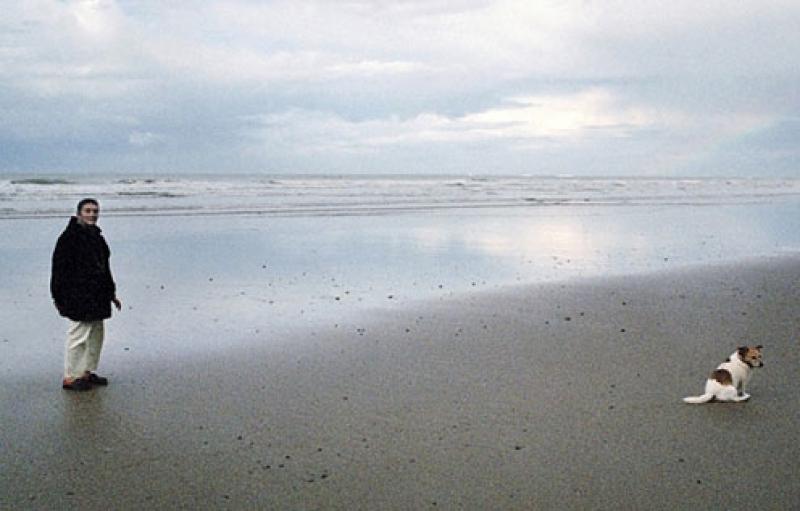
After theartsdesk's round-ups of new music and classical releases on CD, this week we offer our choice of the most interesting new releases on DVD of recent films, and also of box sets and re-issues. Not forgetting this month's stinker. The selection was made by Anne Billson, Ryan Gilbey, Sheila Johnston, Jasper Rees and Adam Sweeting. Click on a DVD cover to find it for sale.
DVD of the Month
 Sleep Furiously, dir. Gideon Koppel (New Wave Films)
Sleep Furiously, dir. Gideon Koppel (New Wave Films)
by Jasper Rees
The wider world is possibly not aware of such a thing as Welsh cinema. The Principality’s export drive has produced several great actors – Port Talbot alone spawned Burton, Hopkins and Sheen (of whom more later), while a Jones girl from the Mumbles has married into a Tinseltown dynasty. But few actual films made in Wales reach a wider audience. Sleep Furiously may very well be the best Welsh film ever made. If this sounds remotely like faint praise, it isn’t. From the opening shot of a town crier walking his small dogs along a road as it winds through steep Welsh hills, we are clearly in the presence of a documentary filmmaker who knows what he’s up to, even if at that point we don't. Ask not for whom that bell tolls - there’s no reappearance for this gaily clad Hardian harbinger of doom - but the film will slowly enlighten you.
Sleep Furiously appears modest in ambition: a portrait of a quiet parish in mid-Wales – Trefeurig – which, though it nowhere says so, is only a few miles from Aberystwyth. But while, seen from the top of the hills, the sea gleams like some beckoning nirvana, the aura of isolation is profound. The elderly, who struggle with their computers, keep in touch with the world outside via a travelling library which brings everything from Monica Ali to vegetarian cookbooks. Meanwhile the school, the lifeblood of the community, faces the dread governmental axe.
Koppel’s film follows the seasons, beginning in high golden summer. It isn’t till 40 minutes in that the first plump drops of autumnal Welsh rain patter on roofs and roads. There is an unhurried feel for rhythm, for narrative by slow random accretion, above all for pictures which tell stories. As winter descends, Koppel’s camera rests on a bare black tree in a stark Beckettian white-out. Here is a filmmaker who is unafraid to linger, not out of directorial affectation, but in sympathetic harmony with his subject. In one shot, his camera rests with daring patience on a bird’s eye view of sheep crossing the opposite hillside like perforated white lines on a slo-mo video game.
There isn’t much dialogue, and a lot of it is in Welsh (which I happen to be learning: the old ladies speak much too fast for me). Koppel’s villagers unburden themselves of little but chatter - this is Under Milk Wood unfiltered by the pen of a poet. Deeply felt emotions now and then surface. There is a beautiful close-up of a conductor lost in the disembodied music she coaxes out of the (unseen) village choir. Quiet despair rests tensely on faces in a village hall meeting about cutting the heart out of the community. But no wonder the school is closing. In one heartbreaking playground sequence, a music teacher scraping a violin leads a percussion group aged from tall to tiny: there are simply not enough children.
Despite the pervasive sense of local life heading for some kind of occlusion, nature refuses to hear the message. Calves, piglets and lambs slither out of wombs, coated in amniotic slime. A baby slumbers twitchily in a cot – the closest allusion to the film’s opaque title (plucked, incidentally, from Chomsky’s illustration of a perfectly senseless sentence: “Colourless green ideas sleep furiously.”) Koppel’s editorialising disdains use of the blunderbuss. On the soundtrack, hypnotic cadences from Aphex Twin discreetly embellish the elegiac tone. The closing images of disused farm equipment stamped with lot numbers is the film’s mute equivalent of the fat lady singing. This tender tragedy is as affecting a portrait of a rural Celtic community as the furtive melancholy of Bill Forsyth’s Local Hero. Is all hope gone for Trefeurig and its like? If you hang around after the credits, there is just a tiny uplifting hint of renewal. Mesmerising.
Other Releases
 Synecdoche, New York, dir. Charlie Kaufman (Sony)
Synecdoche, New York, dir. Charlie Kaufman (Sony)
by Anne Billson
Thanks to his mind-bending screenplays for Being John Malkovich, Adaptation and Eternal Sunshine of the Spotless Mind, Charlie Kaufman is one of the few Hollywood screenwriters who might conceivably be regarded as an auteur. In Adaptation, he inserted himself into the narrative as a fussy, neurotic screenwriter played by Nicolas Cage with even worse than usual hair. Fellini had half a dozen near-masterpieces under his belt before he tried to sum up his life and career in 8½, but Kaufman, making his directing debut with Synecdoche, New York, ambitiously plunges in at the deep end to tackle the big themes - life, death and all the bits in between. The result is a richly detailed tapestry which seems predestined to split audiences down the middle. Sceptics will inevitably dismiss it as pretentious; others will find its reductio ad absurdum of the human condition poignant. Either way, it's a mindfuck, and one that demands multiple viewings.
This time, it's Philip Seymour Hoffman playing the Kaufman surrogate, a fussy, neurotic theatre director whose hypochondria doesn't spare him from genuine afflictions, most of them leaky and disgusting. After his marriage falls apart, he's awarded a MacArthur "genius fellowship" and spends the next two decades constructing a detailed simulacrum of his life in a vast hangar populated by actors playing himself, his women and all the people he has ever met. Then he starts hiring actors to play the actors playing the people. And so on. Time starts to speed up. Even as the theatrical representations are becoming increasingly removed from reality, so it becomes more difficult to tell what's real and what's Memorex.
This may sound overly schematic and wilfully labyrinthine, but as the narrative disappears up its own fundament, Kaufman seeds it with so many surreal, satirical or inconsequential touches that the result feels like an elaborate but only half-remembered dream teeming with ant-like activity and a cast of thousands. Catherine Keener, as Hoffman's viciously plainspeaking wife, paints pictures so small they can only be seen through a microscope. Samantha Morton, as the theatre receptionist who becomes Hoffman's mistress, buys a house which is perpetually on fire, though it never actually burns down. The actor whom Hoffman hires to play himself is a man who has been stalking him for years; on a second viewing of the film, you can glimpse him lurking in the background in the earlier scenes.
The dictionary definition of "synecdoche" (pronounced "si-NECK-duckee") is "a figure of speech in which a part is named but the whole is understood", as in, for example, the way we might say, "several new faces" in lieu of "several new people". So Hoffman is the part, and we're the whole; he's standing in for all of us, and for the way our reality has been hi-jacked by narrative, how each of us is playing the leading role in the story of our life, while the life itself trickles away unnoticed. You'd probably need a PhD in Structuralism to get to grips with all the implications of that, but you could boil the message down to the bumper-sticker maxim, "Life is something that happens to you while you're busy making other plans." The film is sadder and wiser than that, but there's a rare beauty in the sadness and wisdom. There's life, and then there's nothing, but it's all those bits in between that make us what we are.
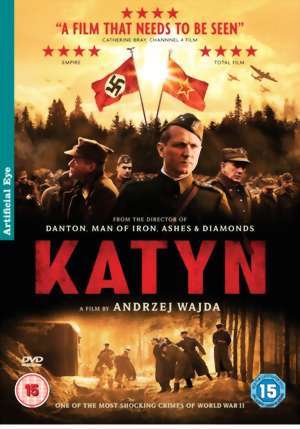 Katyn, dir. Andrzej Wajda (Artificial Eye)
Katyn, dir. Andrzej Wajda (Artificial Eye)
by Jasper Rees
Under communism Wajda may have got away with films which made uncomfortable viewing for the Polish regime, but the subject of Katyn was always a bridge too far. The octogenarian director's treatment of that atrocity is driven by a momentous anger and burning urge to testify. The film takes its name from the village near the forest where the bodies of 4,000 Polish prisoners of war were dug up in 1943. Across several locations in Ukraine, around 22,000 Poles - roughly two thirds of them officers, the rest political prisoners - were killed, without trial or warning, and thrown into mass graves. The Katyn massacre, as it has become known, was part of a Stalinist project to erase the Polish intelligentsia. The discovery of the bodies was made only after the German invasion of the Soviet Union. Even as the Nazis were liquidating Jews in the Warsaw ghetto, Goebbels’s propaganda machine gleefully trumpeted the atrocity as evidence of Bolshevik brutality. Stalin counter-insisted that the mass murders were committed by the Nazis. The Allies kept stumm. Wajda, whose father was one of the murdered officers, finds a way to measure the human cost of history’s tidal wave with the help of a Polish cast on searingly good form. It wasn’t till Gorbachev’s policy of glasnost that the Soviet Union admitted culpability. Having waited 40 years to tell the truth, Wajda waits till the film’s closing moments to lead his audience to the edge of the pit. His aim is devastatingly true.
 Looking for Eric, dir. Ken Loach (Icon)
Looking for Eric, dir. Ken Loach (Icon)
by Sheila Johnston
Eric Cantona pursues his blossoming new acting career with a substantial role in Ken Loach's comedy. He plays an enigmatic guru who imparts his pensées in dope-powered visions to his downtrodden Mancunian namesake, much in the manner of Humphrey Bogart in Woody Allen's Play It Again Sam, enabling the lesser, English Eric miraculously to turn around his life (it may be a little harder than usual at the moment to warm to the travails of the oppressed working-class hero: he's a postman).
Looking for Eric is very lightweight Loach; much of the plotting is lazy and implausible (Paul Laverty supplied the script). There are too many recycled tropes from the director's previous work, such as the stand-up comedians bantering away in supporting roles, as previously seen to better effect in The Navigators, and - a favourite leitmotif, this - the caper set-piece revenge fantasy, in which the workers unite in a comic stunt against the ruling-class bully boys. Loachians will remember the turf-stealing sequence at the start of Raining Stones and the disruption of the glamorous corporate do in Bread and Roses.
For many, Cantona - who initiated the project and co-produced it - will be the main reason to buy this DVD (it would go down a treat, one imagines, accompanied by sardines on toast). The legendary French striker sends himself up something rotten, but Steve Evets proves a strong, sympathetic foil as his furrow-browed disciple, and there is a lively screen chemistry between the two men. It all gives new meaning to the concept of fantasy football.
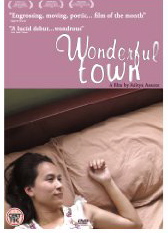 Wonderful Town, dir. Aditya Assarat (Soda Pictures)
Wonderful Town, dir. Aditya Assarat (Soda Pictures)
by Sheila Johnston
Gentle wavelets ripple on a tropical beach at the beginning of this wistful, low-key love story. But the beach in question is in the lush countryside of southern Thailand, in one of the resorts near Phuket devastated by the 2004 tsunami. That event is not mentioned until halfway through the movie, but its shadow looms large over all the characters. Ton is a young architect from Bangkok sent to supervise the construction of a new hotel amid the ruins of the seafront resort area (the building next door, destroyed five years ago, is thought to be haunted and left alone to shelter its ghosts). Na runs a shabby boarding house a few blocks back from the sea which has hardly any clients. Slowly, shyly, the two damaged souls come together, but outside forces militate against them. Wonderful Town could be seen as part of a small spate of films prompted by the tsunami (it would be tasteless, perhaps, to call it a wave) - last week's Vinyan was another, inferior example. Except that you could imagine much the same story unfolding in any closed-off, bigoted community. Assarat frames his images gorgeously and attends carefully to the multi-textured soundtrack; the central relationship is shown unfolding with wonderful delicacy, through tiny gestures: a sip of coffee, an ear pressed to a door, a smoothing of sheets. But the script feels terribly shallow.
The Damned United, dir. Tom Hooper (Sony)
by Jasper Rees
This mud-spattered adaptation of David Peace’s grim, percussive novel asks a question that might not initially seem of urgent concern to all-comers. Why in 1974 did Brian Clough last only 44 days as manager of Leeds United? The fact that his personality is big and brash enough to fill a cinema screen kind of gives you your answer.
After Blair, Frost and Kenneth Williams, Michael Sheen gets inside the skin of yet another figure whose tics are all but public property. The mimicry is typically exact, but Peter Morgan’s screenplay gives him a narrative arc to hang his performance on. The film argues that Clough was consumed by envy and fired by pride. Whether his flaws were tragic or comic depends on which club you support. Pedants will argue that Morgan (taking his cue from Peace) nudges the facts around like a coach changing his formation. But then films, like teams, need to keep their shape. The Damned United suggests that, to kick-start his subsequent resurrection, Clough had to go down on his knees to beg forgiveness from his much abused sidekick Peter Taylor (Timothy Spall in hangdog mode). Did Clough really do that? He did now. A football movie for people who don't know their Brian from their Arthur Hugh.
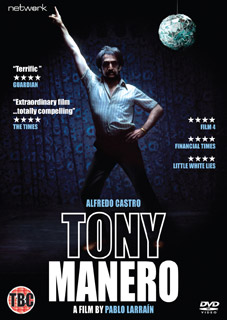 Tony Manero, dir. Pablo Larrain (Sony)
Tony Manero, dir. Pablo Larrain (Sony)
by Jasper Rees
It would be intriguing to know what if any permission was sought for Pablo Larraín's Tony Manero. It tells of Raúl, an amoral middle-aged loner whose burning obsession is to win the Chilean equivalent of Stars in their Eyes in the character of John Travolta in Saturday Night Fever. He will stop at absolutely nothing to live the dream, including murder, theft, looting and, in a climactic soiling of the disco brand, taking a dump on a younger rival’s white three-piece. There is no punishment meted out for any of these casual crimes, but then there wouldn’t be. The film is set in the dark days of the Pinochet regime, and as the events unfold it becomes clear that, in all his nihilism and graphically illustrated impotence, the serial-killing protagonist is a mini-Pinochet of the streets: morally inert, denatured and (not unlike the General when he evaded prosecution in this country) immune from legal censure. Alfredo Castro, who also co-wrote the script, plays the disco wannabe with a dead-eyed, er, chilliness.
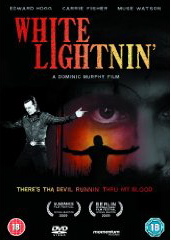 White Lightnin’, dir. Dominic Murphy (Momentum Pictures)
White Lightnin’, dir. Dominic Murphy (Momentum Pictures)
by Jasper Rees
In which a young miscreant from poor white trash stock tries and fails to beat recidivism through some fancy footwork and the love of Princess Leia. This tale of anger mismanagement in rural West Virginia is based on the autobiography of Jesco White, who spent his youth in and out of correctional facilities and the nuthouse, only to find self-respect when he took up his father’s craft of mountain dancing. Which, in case you’re wondering, is sort of solo Highland flinging in dungarees. It’s not difficult to see why White Lightnin’ was released on only a single screen and has gone straight to DVD. Fatally reliant on a voiceover, and interleaved by mannered black-screen pauses, the narrative doesn’t quite grab you by the gills even when the fists fly and, towards the end, the blood starts to cascade. It's of undoubted curiosity value to Star Wars completists who might want to catch Carrie Fisher as a slutty older blonde. And look out for Edward Hogg, a British actor with sinuous screen presence and a flawless Appalachian twang.
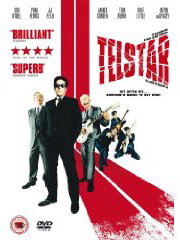 Telstar, dir. Nick Moran (Aspiration Films)
Telstar, dir. Nick Moran (Aspiration Films)
by Jasper Rees
The film of the play of the rise and fall of Joe Meek, the prototype pop Svengali who, in the early 1960s, wrote and produced a string of hits and, increasingly, flops using second-hand equipment and fashioning odd sound effects in the bathroom. Paranoid, drug-addled and closeted, he eventually shot his ill-fated landlady and then himself on the eighth anniversary of Buddy Holly’s death. The narrative travels to the odd gig to open things out, but any movie set largely in a flat-cum-recording studio above a handbag shop in Holloway Road is going to induce claustrophobia after a while. This isn’t the only way it betrays its roots on the stage. To misquote the Emperor in Amadeus, there are just too many words: Nick Moran, making his debut as a director, didn’t quite find the courage to lop sufficient lumps out of his own play. Con O’Neill reliably reprises his impersonation of a shrill diva of the console. But can Kevin Spacey, as a fruity label-owning major, please put away that English accent? And while he’s at it, the moustache.
Box Set of the Month
 Alan Bennett at the BBC (BBC DVD, 4-DVD set)
Alan Bennett at the BBC (BBC DVD, 4-DVD set)
by Adam Sweeting
It’s easy, not least because he actively encourages you to do so, to dismiss Alan Bennett as a rather fey Yorkshireman obsessed with provincial trivia, the forerunner of those people who used to write for music papers and now compose memoirs about how quaint it was growing up listening to Duran Duran in Solihull. But the passage of time only confirms that Bennett has been a titan of stage and screen, and while four DVDs of his work for the BBC can’t hope to circumnavigate the huge scope of his output, this collection rounds up an excellent cross-section and finds the author playing in some of his most resonant keys. Patricia Routledge, a Bennett favourite, stars in A Visit From Miss Prothero and 1982’s A Woman Of No Importance, the latter the first of the TV monologues that Bennett would go on to develop as a particular art. He reflects sympathetically on old age and retirement in Sunset Across The Bay, and in A Day Out Bennett travels back 100 years to survey a vanished Yorkshire via the prism of a men’s cycling club in 1911 Halifax, whose members have names like Mr Boothroyd and Mr Shuttleworth. Then he steps in front of the lens to play the mock-bumbling host in Dinner At Noon and Portrait or Bust.
For many devotees, the twin centrepieces will be An Englishman Abroad and A Question of Attribution, where Bennett unexpectedly but brilliantly went all John le Carré and delved into the hidden lives of the Cambridge spies. Both pieces still dazzle with the elegance and subtlety of their conception, and it was probably no coincidence that each of them united Bennett with producer Innes Lloyd (whom he goes out of his way to praise in a newly-shot introduction) and director John Schlesinger. You’d saw off an arm to find a comparable creative team working in British TV drama today, and this set also contains several examples of Bennett’s many collaborations with director Stephen Frears.
Depicting actress Coral Browne’s real-life encounter with defector Guy Burgess in 1950s Moscow, An Englishman Abroad is still fresh and surprising. Bennett permits a degree of pity for Burgess’s dismal Soviet exile after his peacock years in London (“I used to live in Jermyn Street – tragic, you might think,” comments Alan Bates’s Burgess), but his traitorous past is unsparingly condemned, as is the hypocritical British establishment which helped nurture it.
Meanwhile, James Fox’s portrayal of Sir Anthony Blunt in A Question of Attribution is surely one of the finest performances of his career. Blunt is given the all-clear after cancer surgery, but it’s the hidden cancer of treachery concealed behind his arch, Brian Sewell-ish manner that is evoked by the Queen (Prunella Scales) as Blunt, Surveyor of the Queen’s Pictures, pores over a Titian of questionable provenance: “So if one comes across a painting of the right background and pedigree, Sir Anthony, it must be hard - I imagine - to think that it is not what it claims to be.” Bennett’s creation of a Queen startlingly at odds with the slightly dim, philistine monarch of popular cliché is just one facet of his infinite cunning.
Re-release of the Month
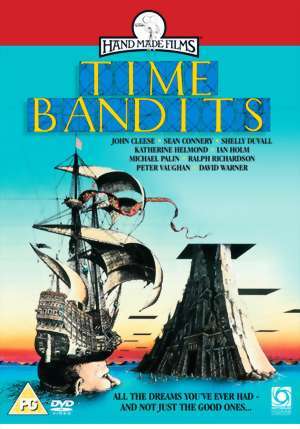 Time Bandits, dir. Terry Gilliam (Optimum Home Entertainment)
Time Bandits, dir. Terry Gilliam (Optimum Home Entertainment)
by Ryan Gilbey
Discounting his co-directing duties with Monty Python, Time Bandits (1981) was only Terry Gilliam’s second feature (after the medieval tomfoolery of Jabberwocky in 1977), but it remains one of his most confident and purely likeable works, ripe for a second look in the light of his new film, The Imaginarium of Doctor Parnassus, which opens this week. A troupe of time-travelling dwarves (led by David Rappaport) burst into the bedroom of a 10-year-old boy, Kevin (Craig Warnock), dragging him on an eye-opening, whistle-stop historical tour. Napoleon (Ian Holm) turns out to be a dullard enraptured by puppet shows (“Zat’s what I like - leetle people heeting each uzzer”), while Robin Hood (John Cleese) is a nincompoop with the dazed air of Prince Charles gladhanding after a Royal Variety Performance.
Other stop-offs include Ancient Greece, where Kevin is temporarily adopted by King Agamemnon (Sean Connery); the Time of Legends, where the gang outwit an ogre (Peter Vaughan) with a dodgy back; and the deck of the Titanic (“Waiter! More ice!”). Lurking at the end of their travels, and supplying the necessary dose of gnarled horror, is David Warner as the dryly funny Evil, the opposite number to the bumbling Supreme Being (Ralph Richardson).
Gilliam co-wrote the screenplay with Michael Palin (who originally wanted the Robin Hood role, but makes do with playing a pair of upper-class twits, both of whom are in love with Shelley Duvall), and the tone leans more toward suburban English whimsy than his later pictures. But that offsets splendidly the scope of the fantasy. There are images here which plug into our primal thirst for adventure - a knight jumping out of Kevin’s wardrobe on a horse and leaping over his bed, which has suddenly been relocated to the middle of Epping Forest; the bedroom wall being pushed backwards until it plunges into space; and that incomparable moment of disorientation when a boat in which the heroes are sailing is shown to be strapped to the head of a giant.
Brazil may be Gilliam’s masterpiece, but Time Bandits is something like its jolly younger sibling, displaying the same suspicion of bureaucracy and technology, but permitting vim and rebellion to win the day. Not only have the film’s jaunty gags stood the test of time, but there’s real weight now to the picture’s strain of anti-consumerism, which once seemed merely an excuse for sitcom-style jokes about malfunctioning blenders and five-speed hedge-trimmers. Kevin’s parents, shallow and pig-ignorant in the Roald Dahl style, are obsessed with household appliances, and their materialism is mirrored in Evil himself, who believes power lies in understanding digital watches and home computers. (If only he’d survived to see the Internet.)
Watch out for Jim Broadbent in a small early role as an unctuous quiz show host, a blueprint for what Chris Tarrant and Noel Edmonds would later become. And cherish the ending, which is one of the harshest but most satisfyingly unsentimental of any "family" film. The extras on this Optimum DVD don’t equal the Region 1 Criterion Collection edition, though at least you get the wildly funny trailer, featuring Michael Palin arguing with the gravel-voiced narrator (“Remember me? I do trailers. All kinds of trailers…”).
Stinker of the Month
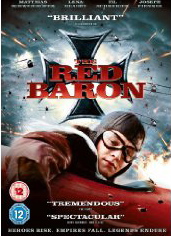 The Red Baron, dir. Nikolai Muellerschoen (Showbox Home Entertainment)
The Red Baron, dir. Nikolai Muellerschoen (Showbox Home Entertainment)
by Adam Sweeting
High above the Western Front, Baron Manfred von Richtofen (Stuart Broad impersonator Matthias Schweighöfer) carves a swathe through the SPADS and Sopwith Camels of his British and French opponents, and becomes Germany’s most revered fighter ace. However, the Baron doesn’t spot the liberal revisionism diving out of the sun until it’s too late. The German airmen are portrayed as civilised, champagne-quaffing gentlemen who abhor senseless killing (“We are sportsmen, not butchers!” the Baron declares), and there’s even a token Jewish flyer to reassure us of their un-Nazi-like credentials. Richtofen keeps bumping into Canadian pilot Captain Roy Brown (Joseph Fiennes) in the strangest places (parked in the middle of No Man’s Land, for instance), where they solemnly debate the evils of war. Equally unpersuasive is the Baron’s romance with Nurse Otersdorf (Lena Headey, speaking mysterious Euro-patois), who sternly reproves him for his frivolous attitude to death and destruction. War-gamers will love the perfectly realised CGI fighter planes, but everyone else should get The Blue Max instead.
The future of Arts Journalism
You can stop theartsdesk.com closing!
We urgently need financing to survive. Our fundraising drive has thus far raised £49,000 but we need to reach £100,000 or we will be forced to close. Please contribute here: https://gofund.me/c3f6033d
And if you can forward this information to anyone who might assist, we’d be grateful.

Subscribe to theartsdesk.com
Thank you for continuing to read our work on theartsdesk.com. For unlimited access to every article in its entirety, including our archive of more than 15,000 pieces, we're asking for £5 per month or £40 per year. We feel it's a very good deal, and hope you do too.
To take a subscription now simply click here.
And if you're looking for that extra gift for a friend or family member, why not treat them to a theartsdesk.com gift subscription?
more Film
 Bugonia review - Yorgos Lanthimos on aliens, bees and conspiracy theories
Emma Stone and Jesse Plemons excel in a marvellously deranged black comedy
Bugonia review - Yorgos Lanthimos on aliens, bees and conspiracy theories
Emma Stone and Jesse Plemons excel in a marvellously deranged black comedy
 theartsdesk Q&A: director Kelly Reichardt on 'The Mastermind' and reliving the 1970s
The independent filmmaker discusses her intimate heist movie
theartsdesk Q&A: director Kelly Reichardt on 'The Mastermind' and reliving the 1970s
The independent filmmaker discusses her intimate heist movie
 Blu-ray: Wendy and Lucy
Down-and-out in rural Oregon: Kelly Reichardt's third feature packs a huge punch
Blu-ray: Wendy and Lucy
Down-and-out in rural Oregon: Kelly Reichardt's third feature packs a huge punch
 The Mastermind review - another slim but nourishing slice of Americana from Kelly Reichardt
Josh O'Connor is perfect casting as a cocky middle-class American adrift in the 1970s
The Mastermind review - another slim but nourishing slice of Americana from Kelly Reichardt
Josh O'Connor is perfect casting as a cocky middle-class American adrift in the 1970s
 Springsteen: Deliver Me From Nowhere review - the story of the Boss who isn't boss of his own head
A brooding trip on the Bruce Springsteen highway of hard knocks
Springsteen: Deliver Me From Nowhere review - the story of the Boss who isn't boss of his own head
A brooding trip on the Bruce Springsteen highway of hard knocks
 The Perfect Neighbor, Netflix review - Florida found-footage documentary is a harrowing watch
Sundance winner chronicles a death that should have been prevented
The Perfect Neighbor, Netflix review - Florida found-footage documentary is a harrowing watch
Sundance winner chronicles a death that should have been prevented
 Blu-ray: Le Quai des Brumes
Love twinkles in the gloom of Marcel Carné’s fogbound French poetic realist classic
Blu-ray: Le Quai des Brumes
Love twinkles in the gloom of Marcel Carné’s fogbound French poetic realist classic
 Frankenstein review - the Prometheus of the charnel house
Guillermo del Toro is fitfully inspired, but often lost in long-held ambitions
Frankenstein review - the Prometheus of the charnel house
Guillermo del Toro is fitfully inspired, but often lost in long-held ambitions
 London Film Festival 2025 - a Korean masterclass in black comedy and a Camus classic effectively realised
New films from Park Chan-wook, Gianfranco Rosi, François Ozon, Ildikó Enyedi and more
London Film Festival 2025 - a Korean masterclass in black comedy and a Camus classic effectively realised
New films from Park Chan-wook, Gianfranco Rosi, François Ozon, Ildikó Enyedi and more
 After the Hunt review - muddled #MeToo provocation
Julia Roberts excels despite misfiring drama
After the Hunt review - muddled #MeToo provocation
Julia Roberts excels despite misfiring drama
 Ballad of a Small Player review - Colin Farrell's all in as a gambler down on his luck
Conclave director Edward Berger swaps the Vatican for Asia's sin city
Ballad of a Small Player review - Colin Farrell's all in as a gambler down on his luck
Conclave director Edward Berger swaps the Vatican for Asia's sin city
 London Film Festival 2025 - Bradley Cooper channels John Bishop, the Boss goes to Nebraska, and a French pandemic
... not to mention Kristen Stewart's directing debut and a punchy prison drama
London Film Festival 2025 - Bradley Cooper channels John Bishop, the Boss goes to Nebraska, and a French pandemic
... not to mention Kristen Stewart's directing debut and a punchy prison drama


Add comment